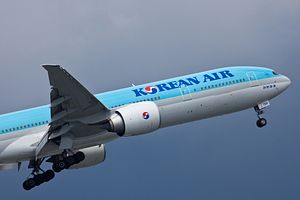It has been almost a month since Cho Hyun-a, daughter of the chairman of Korean Air, resigned after causing an uproar when she delayed a flight because of her anger over the way in which a bag of nuts was served. Nonetheless, the public shows no sign of losing interest in the scandal.
In a country where big chaebol business groups, family-led conglomerates, are famed for their economic and social privileges, the chaebol model is once again coming under scrutiny, as many perceive the nut rage incident as a classic example of the detrimental effects of unchallenged family control.
“The founding family of chaebol can exert non-challengeable power within the group, so they can decide whatever they want,” said Lee Ji-soo, a lawyer at Centre for Good Corporate Governance.
Lee explained that this is possible because South Korea’s unique chaebol model permits founding families to run nominally independent companies within a huge business group by owning a small but controlling interest in the parent company.
Chaebol’s unchallenged power has been always controversial in South Korea, especially among low-income groups, with the largest chaebol largely blamed for the growing income gap.
Curbing the power of the chaebol was one of the main issues in South Korea’s most recent presidential elections, with candidates calling for economic democratization aiming at boosting small and medium enterprises and households. In a recent survey by the Korea Economic Research Institute, 72.5 percent of respondents felt that government policies favored the chaebol.
However, some experts claim that the great power of the chaebols’ founding families is a core element that enables fast and aggressive decision making, with a focus on long-term growth.
“Chaebol want to hand over the companies to sons and grandsons. Therefore, they tend to be more responsible and make longer-term plans,” Park Eun-sung, an analyst at Samsung Securities, told The Diplomat.
“As a result, chaebol played an important role in South Korea’s rapid economic growth over the past 50 years,” he added.
Focusing on the export market, the chaebol groups brought a rapid industrialization to the country with an average of seven percent annually for 50 years. They helped the country to stand as the world’s 10th-largest trading nation by volume as well as a member of G-20 major economies.
“Family running system has its own pros and cons,” said Shin Seok-hun, head of corporation policy team at the Federation of Korean Industries. “But many tend to focus on only a negative aspect of it.”
Shin explained that the family-led firms were the only ones showing good business performance when the global economy was plummeted in 2007.
According to a recent research by a consulting firm, McKinsey, family-led firms now make up 19 percent of the companies in the Fortune Global 500, which is up from 15 percent in 2005. In addition, sales by these firms have grown by 7 percent a year since 2008 while that of non-family firms in the list is 6.2 percent.
“I think the family-led firms will remain competitive in foreseeable future. The positive aspect of them should be stressed out more,” Shin added.

































